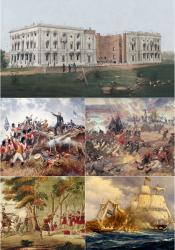The War of 1812
The War of 1812 was a particularly interesting war. For the United States, it has always been represented as “part of a glorious ‘second war for independence’” and a “story about the ‘birth of American freedom’ and the founding of the Union” (Foreman). The US has traditionally viewed it as an important moment in its quest for establishing itself as a nation. But the question remains of how Britain views the war.
General British history of the war has typically “consisted of short chapters squeezed between the grand sweeping narratives of the Napoleonic Wars. The justification for this begins with the numbers: Roughly 20,000 on all sides died fighting the War of 1812 compared with over 3.5 million in the Napoleonic” (Foreman). This is a very important comparison to make. Britain was in the middle of dealing with major events on a lot of sides and can thus be forgiven for seeming to think that the war was inconsequential to them. But this isn’t, in actuality, the case. Reports show that the feelings of Britain “ranged from disbelief and betrayal at the beginning of the war to outright fury and resentment at the end” (Foreman). They viewed the events of the beginning of the war, such as the fears that Britain was impressing American citizens into their navy as weak pretenses for the opening of aggressions in Canada in order to secure control of that area. It also convinced many British citizens that Americans only spoke in empty terms of things like freedom and civil rights but were really “blackguards and hypocrites” (Foreman).
Opinions soured when it appeared like Americans were more ready to accept promises from Napoleon, but not accept promises of the release of their wrongly impressed sailors. Speaking about America, an English captain of the time stated “I am really ashamed of the narrow, selfish light in which [the Americans] have regarded the last struggle for liberty and morality in Europe” (Foreman). The British reacted to the United States’ declaration of war by sending ships over to support Canadian fighting. They also instituted a rather successful blockade of New York, Philadelphia, the Chesapeake and the Delaware. They regarded these moves as “payback for America’s unfair behavior” (Foreman). The blockade proved to reduce American trade by large amounts, and eventual war-weariness permeated both sides, so they reached for a treaty in Ghent, Belgium.
The treaty was not a gain nor a loss for either side. The Americans did not cede any territory, nor did Britain. The victory of the treaty was in simply ending the conflict. Both sides had gained pride and glory in various battles of the time, with Britain gaining them against Napoleon, and the U.S. gaining them in the small victories they had in New Orleans and other areas. The main effects of the war are remembered differently in both nations: “For America, 1812 became the war in which it had finally gained its independence. For Britain, 1812 became the skirmish it had contained, while winning the real war against its greatest nemesis, Napoleon” (Foreman).
Works Cited
Foreman, Amanda. https://www.smithsonianmag.com/history/british-view-war-1812-quite-diffe...

